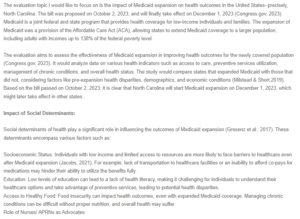Response – Impact of Medicaid Expansion on Health Outcomes in the United States
Hello,
Thank you for your post. Your choice of evaluating the impact of Medicaid expansion on health outcomes in the United States, particularly in North Carolina, is a timely and significant topic. Medicaid expansion has been a critical element of healthcare policy, and assessing its effectiveness is essential to improving healthcare access and outcomes for low-income populations. The evaluation plan you’ve outlined is thorough and well-structured. Analyzing various health indicators, comparing states that expanded Medicaid with those that did not, and considering factors like pre-expansion health disparities, demographics, and economic conditions will provide a comprehensive view of the program’s impact (Heinen et al., 2019). This approach aligns with best practices in policy evaluation.
Subsequently, your acknowledgment of the influence of social determinants of health on Medicaid expansion outcomes is vital. Social factors like socioeconomic status, education, and access to healthy food can significantly affect healthcare utilization and health outcomes (Heinen et al., 2019). This understanding is crucial for developing targeted interventions and addressing disparities that may persist even after Medicaid expansion. Following this, indeed, nurses and APRNs play a role as advocates. They have a unique position in healthcare, bridging the gap between policy and patient care. Their advocacy for patients ensures that the real-world impact of policy decisions is considered. Moreover, their trusted reputation and ability to communicate complex healthcare issues make them influential advocates for legislative reforms (Alsufyani et al., 2020). Nurses’ and APRNs’ first-hand experience in patient care equips them with the knowledge to articulate the challenges patients face within the healthcare system, making their input invaluable in shaping effective policies.
References
Alsufyani, A. M., Alforihidi, M. A., Almalki, K. E., Aljuaid, S. M., Alamri, A. A., & Alghamdi, M. S. (2020). Linking the Saudi Arabian 2030 vision with nursing transformation in Saudi Arabia: Roadmap for nursing policies and strategies. International Journal of Africa Nursing Sciences, 13, 100256. https://doi.org/10.1016/j.ijans.2020.100256
Heinen, M., van Oostveen, C., Peters, J., Vermeulen, H., & Huis, A. (2019). An integrative review of leadership competencies and attributes in advanced nursing practice. Journal of advanced nursing, 75(11), 2378-2392. https://doi.org/10.1111/jan.14092
ORDER A PLAGIARISM-FREE PAPER HERE
We’ll write everything from scratch
Question 

Impact of Medicaid Expansion on Health Outcomes in the United States
The evaluation topic I would like to focus on is the impact of Medicaid expansion on health outcomes in the United States- precisely, North Carolina. The bill was proposed on October 2, 2023, and will finally take effect on December 1, 2023 (Congress.gov, 2023). Medicaid is a joint federal and state program that provides health coverage for low-income individuals and families. The expansion of Medicaid was a provision of the Affordable Care Act (ACA), allowing states to extend Medicaid coverage to a larger population, including adults with incomes up to 138% of the federal poverty level.
The evaluation aims to assess the effectiveness of Medicaid expansion in improving health outcomes for the newly covered population (Congress.gov, 2023). It would analyze data on various health indicators such as access to care, preventive services utilization, management of chronic conditions, and overall health status. The study would compare states that expanded Medicaid with those that did not, considering factors like pre-expansion health disparities, demographics, and economic conditions (Milstead & Short,2019). Based on the bill passed on October 2, 2023; it is clear that North Carolina will start Medicaid expansion on December 1, 2023, which might later take effect in other states.
Impact of Social Determinants:
Social determinants of health play a significant role in influencing the outcomes of Medicaid expansion (Gresenz et al., 2017). These determinants encompass various factors such as:
Socioeconomic Status: Individuals with low income and limited access to resources are more likely to face barriers to healthcare even after Medicaid expansion (Jacobs, 2021). For example, lack of transportation to healthcare facilities or an inability to afford co-pays for medications may hinder their ability to utilize the benefits fully.
Education: Low levels of education can lead to a lack of health literacy, making it challenging for individuals to understand their healthcare options and take advantage of preventive services, leading to potential health disparities.
Access to Healthy Food: Food insecurity can impact health outcomes, even with expanded Medicaid coverage. Managing chronic conditions can be difficult without proper nutrition, and overall health may suffer.
Role of Nurses/ APRNs as Advocates
Advocacy for Patients: Nurses and APRNs advocate for their patients, ensuring that their patients’ opinions are considered within the healthcare system. They can present real-life anecdotes and examples highlighting the effect of the gaps and issues in health insurance. Also, nurses have substantial knowledge and first-hand experience in patient care, which gives them unique insights into the difficulties and demands of healthcare systems and patients. Nurses also have a passion for helping people. This experience is essential in forming conversations about healthcare policy.
Reputations in the Community: Nurses and APRNs have a reputation for being one of the most trusted professionals. When it comes to lobbying for legislative reforms linked to health insurance, their advocacy’s effectiveness stems from their reputation and capacity to articulate complicated healthcare concerns.